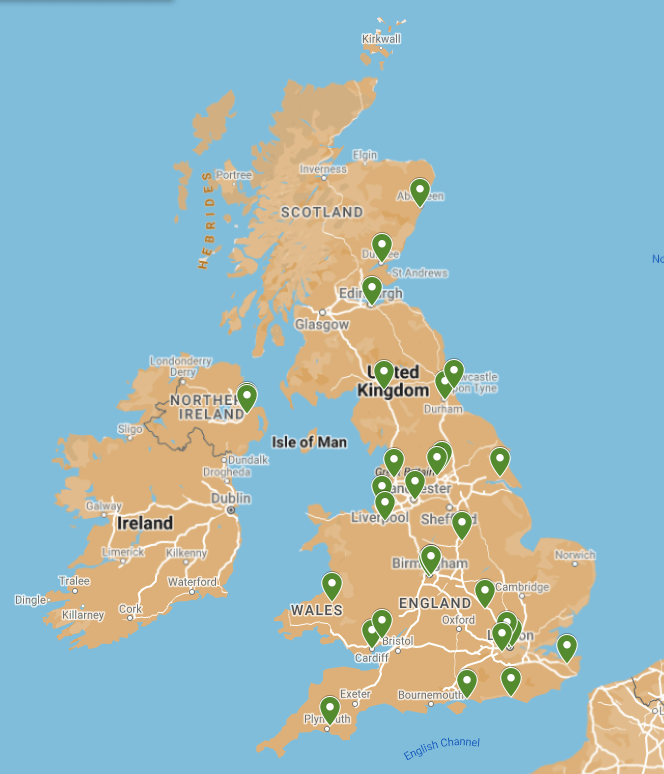The 'Holistic Approach to EDI' project is one of our most exciting areas of current work that has led to interesting discussions with member institutions over recent weeks. Below we share an overview of our progress to date as well as some of the emerging findings and an opportunity for the wider community to engage. If you’re interested in more information on the project and background context, please visit our project page here.
Excellent engagement
Thirty-three institutions have confirmed their participation in the Discovery Phase; we are so grateful for these institutions and the colleagues around the country that have offered their time and insights to the project during what is an incredibly busy time for everyone in the sector. The participating institutions cover almost every region of the UK, all mission groups (and some with no affiliations), and a wide range of sizes, with student populations ranging from less than 5,000 to more than 25,000.

The engagement with 15 of these institutions has already taken place with further meetings planned over the coming month to explore and collate detail on structures, current practice and challenges in relation to developing a holistic approach to EDI.
Emerging findings
There is a high appetite for a more strategic, intersectional approach which allows institutions to identify and act on their priorities. While a key driver is harnessing the opportunity to use resources more efficiently and effectively, members are also identifying a need to reflect within their EDI activity a ‘whole person’ approach to staff and students in their communities. Current approaches based on single characteristics, such as race, gender, or disability are recognised as meaningful and impactful, however challenges relating to the resource-intensive work have been identified.
Members generally anticipate that their communities would welcome a move to a more holistic approach, though with some concerned about the risk of ‘watering down’ or stalling progress in some areas of EDI – especially race equality work.
Anticipated challenges and existing opportunities
Some other identified challenges to working in a more holistic way include how to bring together disconnected, under-resourced teams, and regarding data, working with small numbers, misaligned data collection categories, and unreliable or unavailable data. Additionally, while many institutions see the value of aligning EDI work with activity relating to access, widening participation and socio-economic status, most report weak or no links currently between these areas of work. Moreover, with most work focusing on student access to higher education, there is little reported activity relating to staff socio-economic status.
Despite anticipated challenges, some institutions already see themselves as working in a holistic way. Discussions have highlighted examples such as menopause-related support activity, the use of equality impact assessments, awarding gap work, governance structures and the approach to inclusion and belonging on international campuses. Throughout this project, we are striving to identify good practice where it currently exists and hope to share more detail with members after the completion of this Discovery Phase.
Upcoming events
We will hold several roundtable discussions in the coming weeks to explore these emerging themes and to hear from members across the sector and globally. We will share some of the early project findings and welcome input into our analysis and development. Details and booking links for these roundtables can be found below (please note we are holding several iterations of the same roundtable discussion to maximise capacity, so there is no need to register for more than one event):
- Roundtable 1: 21 March 2024, 13:30 – 15:00 GMT; Fully booked.
- Roundtable 2: 27 March 2024, 15:00 – 16:30 GMT; Places remain available, Register here
- Roundtable 3: 8th April 2024, 08:00 – 09:30 BST; Places remain available, Register here
How would you define a ‘holistic approach’?
We have been blown away by the engagement and interest in this project and want to thank all our members and collaborators for their support. While we haven’t been able to include all interested institutions in our case study and interview meetings due to capacity, we are keen to hear from people across our wider UK and global community. We will be using some crowdsourcing tools over the coming months to gather insights, and the first asks you to share your thoughts on how to define a ‘holistic approach’ - please join in here.
Read our updates and access previous reports on this project here.
Interested in any of the areas mentioned in this blog? You can continue the conversation on Advance HE Connect to share your insights and experiences.